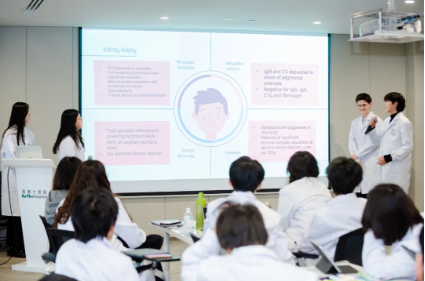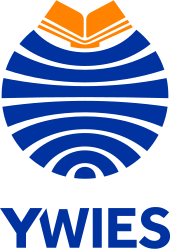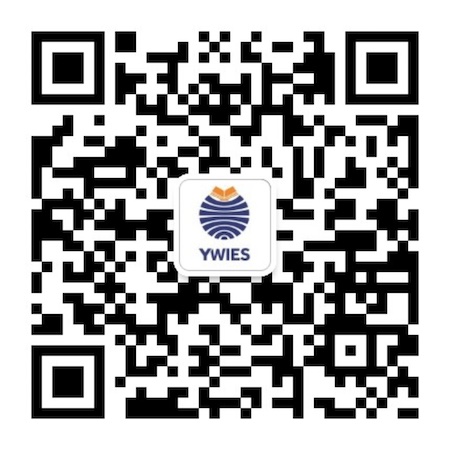Go Back
News
School News
How YCYW Students Learn to Think Like Doctors
School News
24 Apr, 2024
15 : 48

During 15-19 January, 25 students from various YCYW schools interacted with healthcare professionals in diverse fields at the Raffles Hospital Chongqing. The students observed the daily routines of doctors, and used artificial intelligence to diagnose difficult cases "like a doctor". They also talked with the hospital managers to broaden their perspectives on hospital operations and strategies.
Dr Christopher Hurley, Head of the EdFutures Division at YCYW and the teacher in charge of the project, explained,
"We are passionate about giving our students opportunities to try new things, to experience the real world, and to connect with experts from a range of different industries and from around the globe. We want to help our students to imagine the future, and develop new skills such as networking and critical thinking, as well as the ability to solve non-structural problems in different industries."
Learning in an authentic environment
What are the four major body signs that doctors pay most attention to? These include breathing, heartbeat, blood pressure, and body temperature.
After rotating through more than a dozen departments over several afternoons, each student became familiar with these basic medical issues and gained a better understanding of the overall operation of a hospital.
In addition to helping his classmates with teeth checkups and observing the structure of his brain through a CT (computed tomography) scan, Alex found orthopaedics particularly impressive. The doctor showed him orthopaedic cases and surgical teaching videos, highlighting how doctors commonly use a simple tool like a hammer to realign bones.
Richard from YCIS Hong Kong is most interested in anatomy and medicine, and has been reading many popular science books on the subject since he was ten. The programme rekindled his long-set-aside interest. During his visits to various departments, he always asked doctors about organ structures and the essentials of surgical suturing, an activity in the programme that particularly attracted his attention.
"Threading the needle" on a silicone simulated skin model and suturing wounds of different lengths is not a simple task. "It took me an hour or two to complete just a few stitches, but hearing the doctor mention that their standard is more than 100 stitches per hour truly impressed me," Richard said.
"Does frequent wearing of in-ear headphones have an impact on my hearing?" "What are the usual signs of gynaecological diseases, and how can girls prevent cervical cancer?" "Why do people sometimes twitch their feet when falling asleep?" "What are the consequences of having excessive fat in the blood?" The students asked the doctors these questions about physical health.
"We discussed a lot with the students about how to develop a relationship with the doctors and how to talk to them. The students asked great questions, using their insights. The programme was a wonderful place for the students to start developing their confidence, their communication skills, and their ability to leave a good impression," Dr Hurley remarked.
One step closer to the dream of becoming a doctor
Dr Hurley said, "One of the characteristics that we like about Raffles Hospital is their approach not to over-diagnose and not to over-prescribe. They believe in holistic, integrated medicine, and seek natural ways for people to improve their general health, such as exercise, nutrition, and sleep. We also talked about these aspects with the students, and whether hospitals should offer 'sick care' or 'health care'. We think this is an important philosophical issue for the students to explore and understand."
Building upon this, the students also discussed moral and ethical considerations in medicine, such as how to protect the patients' privacy and provide holistic care.
Guided by a doctor, the "little doctors" had the opportunity to visit the neurology ward. They heard questions such as: How are you eating? How well are you sleeping? Where are you feeling uncomfortable? The cordial communication between the doctors and the patients—as if they were chatting—also inspired the students to think about what they had observed.
"Good communication and a strong relationship between doctors and patients are essential parts of effective treatment. If the patients don’t trust their doctors, the treatment will not be as effective," said Helena, a Year-13 student from YCIS Beijing. She realised that good doctors not only treat their patient's symptoms but also have great compassion for their patients. Doctors advocate for the well-being of patients and try to help the patients regain their health.
When Helena was seven or eight years old, her paternal grandmother passed away because of a heart attack. This sparked Helena’s aspiration to become a doctor. Later, she delved into many documentaries and books, and became concerned about the pressing problems of global equalities in healthcare systems. She is already preparing to apply medical schools in her home country of the Republic of Korea. Her dream is to become a surgeon and join Médecins Sans Frontières (MSF).
Also reporting a similar aspiration is William from a non-YCYW high school in Hong Kong SAR, He eagerly signed up for the programme after a friend forwarded the announcement to him. He even had to seek special permission from his school because the programme dates coincided with that of his exams. Before leaving for Chongqing, William reviewed the resumes of all the doctors at the Raffles Hospital Chongqing to learn about their educational backgrounds, so that he could discuss the differences in medical education systems across regions and seek advice about his own future medical career.
Leo, a final-year student at YCIS Chongqing, emphasised how his in-depth experience at the hospital will be a highlight when preparing his personal statement for university applications.
Helena admitted that she has few opportunities at her school to talk about her interest in medicine or to discuss current issues in the healthcare industry. She thoroughly enjoyed her five days in Chongqing, surrounded by classmates with similar interests.
Building connections between multidisciplinary knowledge and the natural world
"We interacted like colleagues within the hospital, and as friends outside the hospital." Despite being the youngest participant in the programme, Declan from YCIS Chongqing showed no signs of being timid. Quantum physics fascinate him, and the radiology department satisfied his curiosity. The doctors there explained in detail the physical principles of equipment such as CT and MRI (Magnetic Resonance Imaging).
Linda from YCIS Shanghai is already preparing to take the IG Chemistry course. She is interested in exploring the field of pharmacology rather than studying to become a doctor. During the programme, she excelled at identifying connections between chemistry and medicine. Emma, from YCIS Chongqing, loves biology and is fascinated by chemical reactions, particle movements, the flow of energy, and how the immune system reacts within the body. Emma extends her knowledge beyond the classroom through personal engagement with various detection instruments and methods.
"We want the students to think about how they connect what they are learning in chemistry, biology, physics, or even physical education classes, with their experience at the hospital. We think that's important. The students can integrate what they are learning at school with the real world and the fields that they are passionate about," Dr Hurley said.
Departments as small as the cafeteria or the laundry, or as big as purchasing and general operations are all essential for the hospital.
"It's not just about being a doctor; it's about a whole range of different fields which are connected to medicine that we want to explore, such as psychology, social work, business management, etc." Dr Hurley explained.
The doctors never hesitated about sharing the realities of the ecology of medical care: the exhausting night shifts in emergency medicine department at public hospitals, the pressure of performing dozens of interventional puncture surgeries each day, and the potential risks of occupational diseases. These discussions deepened the students' understanding of the differences between public and private healthcare systems. In the group report on the morning of the 19 January, each student summarised the strengths and weaknesses of Raffles Hospital. Some groups also proposed offering commercial insurance for doctors as a talent incentive.
Because of her interest in economics and entrepreneurship, Emma became one of five student representatives who attended the "Hospital Director's Lunch".
"It was a very valuable opportunity for me to have an exchange with the hospital management," Emma said. "Hospital managers think differently from doctors. While managers are concerned about costs, doctors want to give patients the best care. This difference in priorities sometimes causes conflicts. It was great to hear their different perspectives."
When ChatGPT becomes a "Medical Assistant"
"The YCYW students were very active in their thinking and asked a lot of questions," Dr Yan Guifang from the Department of Oncology said. She recalled that the question that left the most lasting impression: In terms of clinical diagnosis, is it possible that artificial intelligence (AI) could potentially replace doctors in the future? In her opinion, the answer is no.
The current AI used in imaging assisted diagnostics is prone to "false-positive" results because of its high sensitivity. Experienced doctors with expertise and logical thinking are still needed to make the final judgement and diagnosis.
"Using AI to solve medical challenges" is one of the core components of the project design. The students worked in groups to study cases and determine the tests that needed to be done based on the patient's symptoms and medical history, including blood and urine tests, CT scans, and biopsies. ChatGPT played an important role as their "medical assistant". Despite this, one group of students took advantage of the opportunity and asked the doctors about the accuracy of their diagnosis.
"I don't think the results matter that much. It is the thought process that counts and the method of eliminating various options to find the correct one. That's really what I'm learning," Emma said.
For several nights in a row, the students programmed their smartwatches with the assistance of ChatGPT. After trial and error, it was indeed an inspiring movement to reconnect the sensor and see the dial suddenly light up with the heart rate pulsating in real time.
"When working with AI, you need to learn how to ask the right questions and probe deeper. When you are thoughtful and communicate with AI at a deep level, that's when AI becomes very powerful. Mastering the skill of asking an appreciative inquiry is one of the key qualities of a highly successful individuals," Dr Hurley said.
He explained that all projects of YCYW's EdFutures Division focus on the use of AI to broaden the areas that students can explore. "We want our teachers to explore the world with the students, cultivate their enthusiasm, and empower them to work with technologies like AI so that they can explore the world together as part of a learning community."




